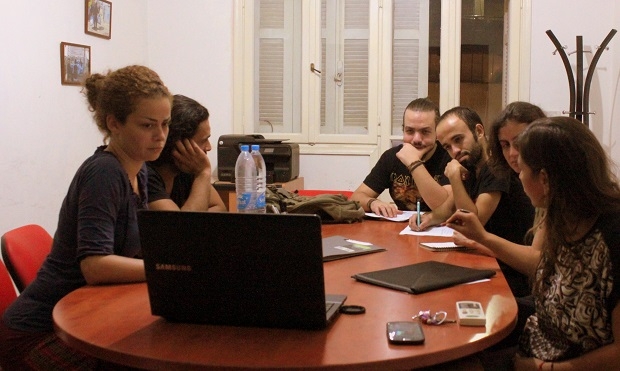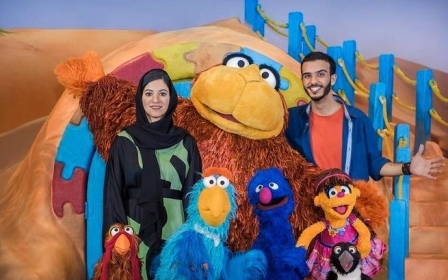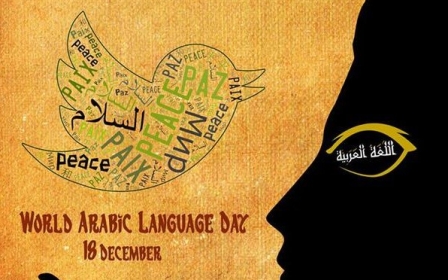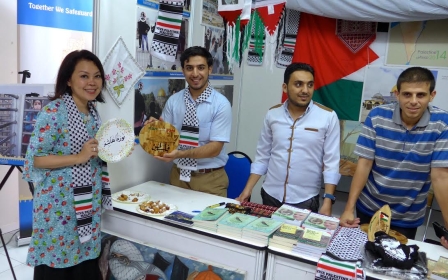Making friends with Syrian refugees while learning Arabic

Every week, from the comfort of his Brooklyn apartment, William Mathis peeks through a Skype window into Samer’s life as a Syrian refugee in Beirut. Likewise, Samer says, he is familiar with details of William’s life.
“William used to live on a farm,” laughs Samer. “A real farm, with real chickens and cows.” He finds this fact amusing, perhaps imagining a stereotypical spaghetti-western cowboy farm. “Plus, we have a lot in common - we’re both writers.”
“That’s the point of of this project,” continues Samer. “That people across the world are connecting with each other.”
He’s referring to his role as an instructor in a language platform called NaTakallam, which employs Syrian refugees in Lebanon by pairing them with Arabic language students around the world.
Filling a gap in the Arabic learning community
NaTakallam (which translates to "we speak" in Arabic) is a digital language immersion that allows students of Arabic to practice their colloquial conversation skills with native speakers.
Conceived by University of Columbia alum Aline Sara, NaTakallam was founded by her and two other graduates of Columbia’s School of International and Public Affairs, Anthony Guerbidjian and Reza Rahnema.
Sara, who is a Lebanese-American raised in New York, said the idea was born of frustration caused by witnessing the working conditions of Syrian refugees in her homeland during her trips to Lebanon: “It was a very organic reaction to being Lebanese and seeing the effects of the conflict, and the influx of Syrian refugees in Lebanon, because it isn't easy being a refugee in Lebanon.”
A diaspora upbringing was also a significant factor which contributed to her motivation for the project. Although fluent in English, Sara’s Arabic language was limited, leaving her to pursue study of the language in school.
Traditional Arabic instruction in academia and language institutes is typically limited to “fusha,” or Modern Standard Arabic - a classical form of the language used in literature and media but rarely used in spoken dialogue.
However, many students, especially those who travel to the Middle East, are interested in “ammiye”, the colloquial and primary form of spoken Arabic in a specific region. Sara witnessed this need within the international community in Lebanon, where those trained in classical Arabic would have trouble speaking in the streets of Arab countries.
“People study fusha and then travel somewhere like Jordan or Cairo, speak to the cab driver, and realise it’s not the best dialect for effective communication,” she says.
“So we’re catering to a specific need in the Arabic learning community… because you learn a language by speaking it, not just by learning from textbooks.”
Employing Syrians in Lebanon
NaTakallam provides an income for Syrian refugees in Lebanon, who number a quarter of the total population, according to the UN refugee agency (UNHCR). At over 1.2 million Syrian refugees, Lebanon contains the highest per-capita number of refugees worldwide.
Syrians are the modern world’s largest refugee population, according to Mercy Corps. With over 3 million fleeing the war to neighboring Turkey, Lebanon, Jordan, and Iraq, the war in Syria has resulted in the worst refugee crisis since World War 2.
As a small country dealing with numerous internal difficulties, Lebanon struggles to keep pace with the ongoing refugee crisis. Additionally, Syrians are forbidden from legally working in Lebanon without a visa or residency permit, the latter being extremely difficult to come by, or company sponsorship, which leaves workers vulnerable to exploitation by sponsors.
Due to the limitations on legal employment, according to the International Labour Organisation (ILO), 60 percent of the Syrian labour population in Lebanon are employed in potentially exploitative conditions in the informal economy - meaning, illegal or undocumented work. Low wages and harsh working conditions are characteristics for Syrians who can typically be found working in the construction sector or as field labourers, and living in extreme poverty.
With Lebanon’s average minimum wage of $448 per month, Syrian refugees are generally paid 40 percent less.
On top of that, Syrian women are typically paid 40 percent less than their male counterparts, according to the ILO.
NaTakallam aims to provide an alternative to the exploitative labour conditions and high unemployment rates - or at the very least, a supplementary income - by offering fair wages and scheduling flexibility. At $15 per session, seventy percent of the money from the language sessions goes to pay the Syrian conversation partners - the same amount for females and males. The remaining 30 percent goes back into developing the relatively new platform.
“I average around 25 to 30 hours per month, and have about eight repeating students,” says Samer. “And that number will likely go up as NaTakallam develops.” For him, the flexibility of the language sessions is an advantage - conversation partners get control over the number of sessions they choose to do and therefore, the resulting income.
Still a new start-up after having recently graduated from its pilot phase last July, NaTakallam is actively developing and recruiting Syrian conversation partners in an attempt to meet the surge of demand from language students worldwide. There are presently 80 students matched to 15 conversation partners, but with over 500 sign ups due to a sudden surge in the project's popularity, NaTakallam is working on developing its platform to meet the supply of conversation partners with demand.
A human connection
Students are paired up with talking partners according to a sign-up which surveys their level of Arabic in both classic and colloquial, their field of study, range of interests and schedule.
For William Mathis, a 26-year-old freelance journalist and gardener, NaTakallam is really about his conversation partner. He’s done eight sessions with Samer, he says, and in that time they’ve become good friends.
“We’ll talk about how he’s doing, how it’s going for him in Beirut. He’ll tell me errands he has to run,” says Mathis. “One of his errands for example will be having to go an embassy to get an asylum application for his sister-in-law or something. She was preparing to go on a boat from Turkey to Italy.”
Mathis, who follows international news and is knowledgeable about the conflict in Syria, asserts that the platform has a very compelling effect. “Hearing Samer talk about [his life] in a very real way is very different from reading an article in terms of impact. Reading about it seems unimaginable but to hear it from the perspective of one person makes it comprehendible and real.”
Samer, a poet and writer who could not disclose his real name or details of his life to the media for security reasons, was in his second year of law school prior to the war, which led to his arrival in Lebanon. For him, NaTakallam is a way to bridge the gap betweenn east with the west.
“The most important part of this project is the communication between different cultures, different parts of the world, because there’s a big rift between east and west - especially in terms of Syria.”
Samer’s Damascene drawl is as long as his hair, and he has a fitting penchant for dialogue. He announces, “I want to show the world that we, Syrians, are a wide range of people - artists, writers, sculptors, lawyers, engineers. We are not ISIS and Jabhat al-Nusra or Islamists who want to kill heathens.”
That was a significant factor for his participation in NaTakallam. Beyond improving their Arabic, Samer wants his students to realise they are speaking with a peer, who, he says, “is not any different from them, despite the war. I want them to understand that there is a different side to Syrians and to the Syrian story, which the media doesn’t provide.” He pauses to drive home his point: “At the same time, I’m providing a service as an instructor, and both sides are benefiting.”
As for improving his Arabic, Mathis laughs - it’s a slow process. “I’ll try to tell him about what’s been going on in my week, and he uses that as the basis for vocabulary and grammar lessons.”
The comfort and ease of his friendship with Samer helps the sessions, but Samer is still very much an instructor. “Whatever I say, he’ll correct and teach me how to say it better,” says Mathis. “So the things I do and that I usually talk about, I’m learning how to say in Arabic. At the end of each session he’ll give me a paragraph based on what I’ve told him and have me work on vocabulary for the next time.”
Samer says he employs a variety of conversational teaching methods. One of his students is an aid worker in Italy helping refugees who land ashore from the Mediterranean Sea. Her Arabic was nearly nonexistent. “I started my sessions with her by imagining a dialogue between her and a refugee who just arrived in Italy, tailoring the vocabulary to her needs step by step.”
A work in progress
NaTakallam is a relatively new platform, and still faces complications. The conversation partners must navigate Lebanon’s frequent power cuts and poor telecommunications, sizeable issues when it comes to scheduling sessions. Time differences can also complicate matters, as students sign up from around the world and must manoeuvre sessions around their work, school or children.
“Their lives get in the way, or the time difference, and the power cuts are difficult... sometimes the connection is not great, so postponements happen - either from my end or from the students,” says Samer, citing it as a source of frustration. “But we give a good service. And that’s why students keep continuing with us.”
While the platform can’t do anything regarding power cuts, NaTakallam has partnered with SAWA for Development and Aid to provide the conversation partners with a room that has a reliable internet connection, should they require it - as reliable an internet connection as Lebanon can offer, at any rate.
“Actually we had to cancel the last session we had because the connection wasn’t good,” says Mathis. However he claims the sessions are worth it, because they aren’t just classes, but a chance to catch up with a good friend.
Samer agrees. “William and I are like two friends catching up at a bar,” he laughs.
More than that, Mathis stresses, “It’s an opportunity to know what’s happening on the other side of the world, to speak with someone in Arabic, and to have a very personal connection.”
New MEE newsletter: Jerusalem Dispatch
Sign up to get the latest insights and analysis on Israel-Palestine, alongside Turkey Unpacked and other MEE newsletters
Middle East Eye delivers independent and unrivalled coverage and analysis of the Middle East, North Africa and beyond. To learn more about republishing this content and the associated fees, please fill out this form. More about MEE can be found here.




